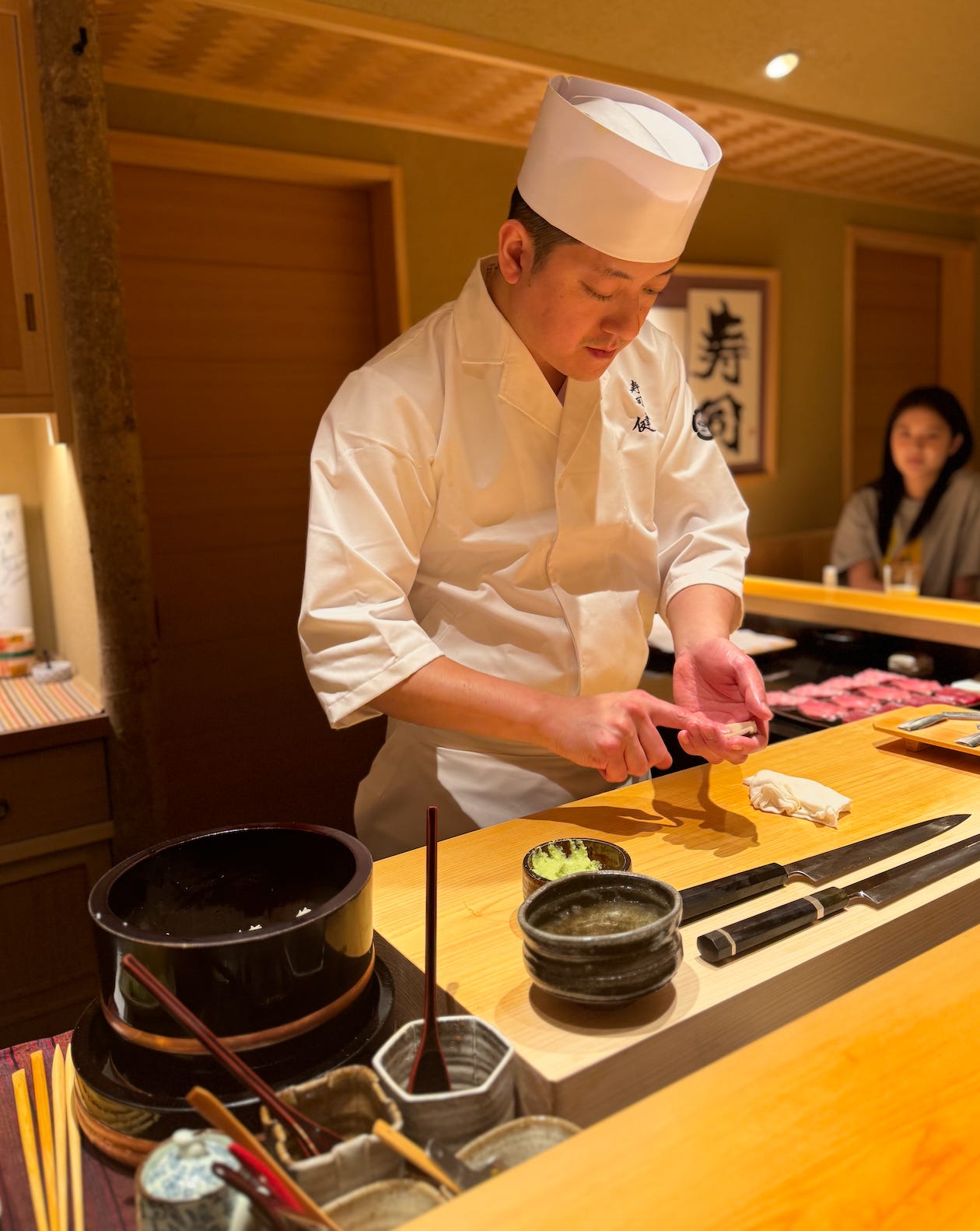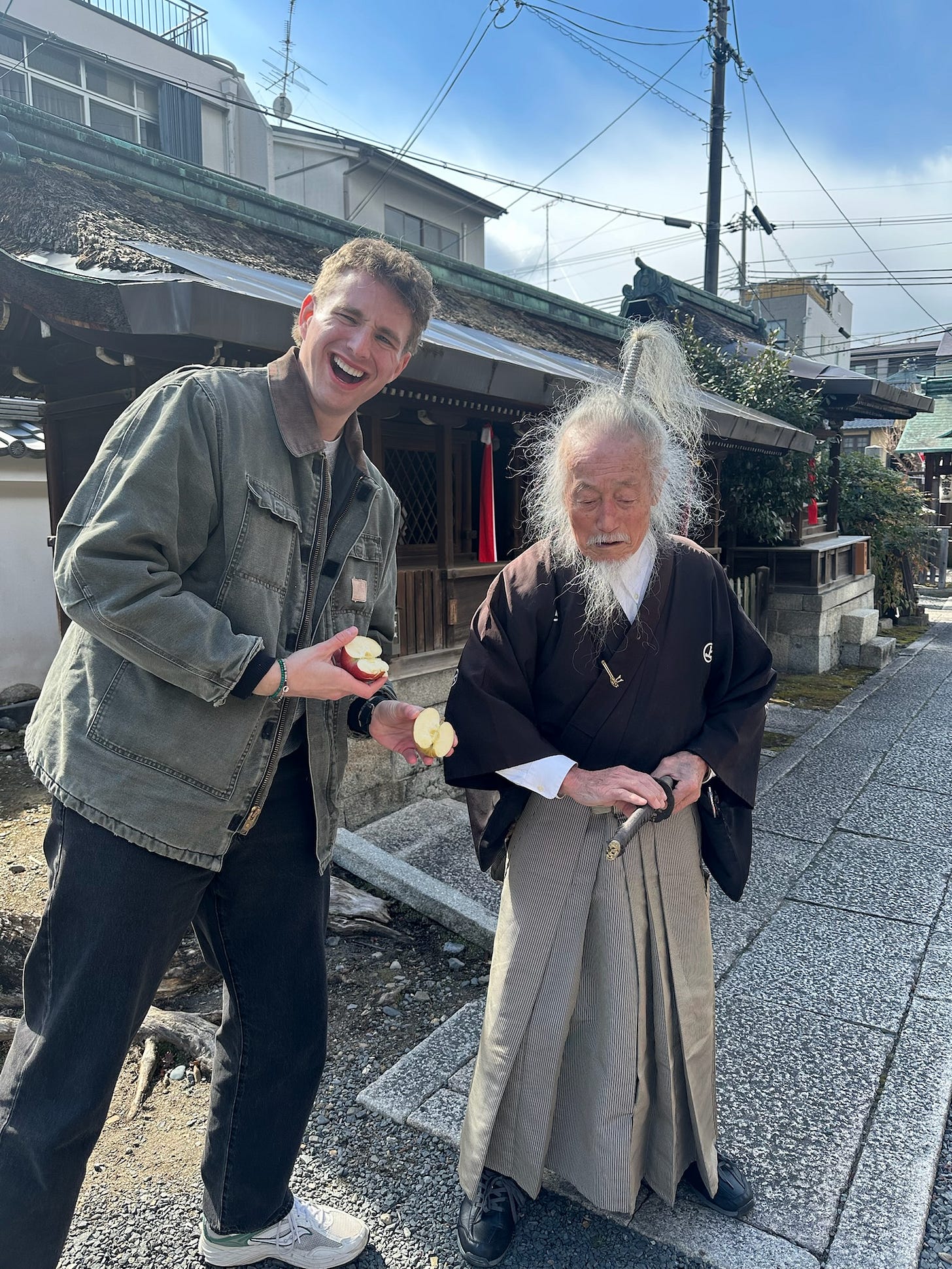Two new issues of Field Notes will be released this weekend and next weekend, packed with restaurant and travel recommendations for Tokyo and Kyoto/Osaka — subscribe now so you won't miss them!
As I eased myself into the steaming waters of a hot spring bath at the remote countryside inn, the stillness was gently broken by the murmur of an American voice drifting through the fragile paper walls.
I’d returned to Japan for the third time: to chase the kind of confusion and gentle mishaps had made it so enjoyable before. But travel is changing. Earlier, I'd watched the American checking in, tapping earnestly into Google Translate to solve an issue. The elderly innkeeper—whose family had run this inn and its onsen (baths) long before the first smartphone or foreign guest ever arrived—nodded politely, replying through the screen as if he'd always done it this way.
Not so long ago, traveling here required careful preparation and a willingness to get lost. Finding an inn like this once meant deciphering maps, puzzling over bullet train schedules and street signs that seemed purpose-built to frustrate outsiders, and celebrating triumphantly when, against all odds, you found yourself at the gates. Today, Google Maps delivers you straight to the doorstep, calculating your arrival down to the minute. Even the thrill of Japanese vending machine roulette has diminished—ChatGPT can tell you exactly what's in every mysterious bottle or snack.
Some resistance to "tourism on easy mode" persists. Many of the best restaurants refuse reservations via email, social media, or even English telephone calls. This policy is understandable, but it's only a matter of time before an AI agent can flawlessly book seats for omakase (chef’s choice of sushi), paving the way for the most unappreciative guests imaginable. At one centuries-old soba (buckwheat noodles) restaurant in Kyoto, a nearby group of tourists used Google Translate to inform the waitress that, while excellent, the food "could have used some garlic powder." It's no wonder some of Japan's greatest countryside inns maintain zero web presence, deterring foreign tourists altogether - unless they get a recommendation from a local in the know.
Perhaps inevitably, menus there have begun preemptively translating dishes to avoid awkwardness. “Fish sperm,” becomes the more palatable “soft roe” or “cod milk.” Near Tokyo Station, I had dinner with a local friend who pointed out the restaurant’s Japanese-language menu quietly advertised “all you can drink for $30”—an offer notably missing from its English counterpart.
Travel advice for Japan from the pre-smartphone era now seems charmingly redundant. Keep a card with your hotel’s address in Japanese? Just use Uber or show the driver Google Maps. Carry wads of Yen? "Cardo" is almost universally accepted now.1 Your well-traveled uncle might warn tattoos will exclude you from the respectable baths and hotels, but today's trendy Japanese patrons sport Carhartt streetwear over patchwork inked sleeves—if you're turned away, it's likely because you're foreign, not because of your tattoos.
Over an omakase lunch, I asked a sushi chef if he minded that half his customers were now foreign visitors. “No,” he said, aware of the power of the dollar, as long as they truly appreciated the sushi.
Yet at one of Japan's best sushi restaurants, I watched as a wealthy Chinese tourist, covered head-to-toe in branded designer clothing, scrolled through his phone while casually shovelling Otoro (fatty tuna) into his mouth, without ever glancing down.
It’s not just Japan. In places that once promised isolation or adventure, connectivity is now constant. A friend who hoped for a retreat from the world booked a horseback trek across Mongolia's steppes and found better 4G there than in parts of London.
The obvious solution is the occasional rebellion. In Kyoto, I abandoned any pretence of an itinerary and entrusted my day to a 95 year-old guide called ‘Joe’ Okada. Joe is Japan’s oldest tour guide. He spent his childhood in Japanese-occupied Manchuria, built warplane propellers as a teenager, watched B-17s drop firebombs on Japan and narrowly missed becoming a kamikaze pilot, finally learning English playing baseball with American occupiers.
Joe didn’t care about online ratings or influencer recommendations; instead, he lamented modern Japan's obsession with sweetened matcha and insisted on showing me his favourite hidden spots.
As a respected elder, Joe moved freely. I watched him firmly slap an antique samurai helmet despite a sign pleading, “Please Do Not Touch,” simply to demonstrate its strength. Later, he confidently entered a bustling sushi restaurant with a line of tourists out the door, emerging moments later with fresh inari sushi (stuffed tofu pockets) personally delivered by the amused staff.
After the sushi he took us a few doors down into a quiet cafe. He wandered into the kitchen and politely shouted at a chef who followed him out and at a formica table demonstrated with remarkable skill how to make a perfect cup of true matcha. He was a champion maker, Joe told us, but didn’t advertise the fact and so didn’t get the crowds.
Later, in the quiet of a local courtyard, Joe taught me2 how to slice fruit and vegetables with a samurai sword, gently insisting I gather the scattered pieces afterward, as his wife planned to cook them for dinner.
Amusingly the thing that Joe seemed to enjoy showing us the most wasn’t Kyoto’s temples or its dedicated craftsmen, but an automated storage machine that takes bicycles and uses a robot elevator to deposit them deep underground. We stood there and watched it consume bikes for some time, Joe chuckling and growing no less bored as each bike went down.
The irony is of course I had found Joe online, yet his presence felt deeply out of step with the digital age. When he spoke of wartime Japan or post-war occupation, he wasn't reciting history but sharing memories. His knowledge wasn’t searchable or taggable—it lived in quiet friendships built over decades, in personal connections to shopkeepers and craftspeople whose names would never surface on an app.
Spontaneity can be seen as inefficient now. It must feel underwhelming for tourists, I think, arriving at temples or landmarks already familiar from months spent scrolling online. The most memorable shrine I've visited in Japan was one I found by accident in Tokyo, dedicated to Admiral Togo. It stays in my mind as one of its plaques, an argument is made that Togo was the literal reincarnation of Horatio Nelson.
Similarly, one of my best meals this trip was at a Michelin-starred yakitori place we stumbled into without reservations, catching a last-minute cancellation. Pure luck, and utterly delicious. Afterwards, we found out the restaurant has a 3-month waiting list.
My friend Chris Arnade wrote a great tale from his trip to Japan about how he made friends with an izakaya (pub) landlord and its customers, all by accident when he had the intention of going somewhere else entirely.
The more accessible Japan becomes through apps and translation tools combined with a very attractively weak Yen, the more its most cherished establishments will try to retreat from that accessibility. The ryokan owner who once welcomed the rare foreign visitor now hides from TripAdvisor fame. The chef who might have proudly served a curious gaijin (foreigner) now requires expensive Japanese intermediary agencies to make reservations and filter out the ‘unsuitable’.
Technology can enhance our adventures, but true discovery happens when we put the phone away and connect with people on their terms. That remains timeless.
If you do find yourself stuck with language issues in Japan, my advice is simple: just add an '-o' at the end of your request. Want hot coffee instead of cold? Ask for “hotto.” It might feel a bit silly at first, but trust me—it works.
Video of my attempt is here: https://x.com/ned_donovan/status/1893616167660515446?s=46












Well said! What a great reminder to keep spontaneity available and allow it a place in our travels. It's important, now more than ever.
As a regular traveler this is precisely my experience - a terrific piece!